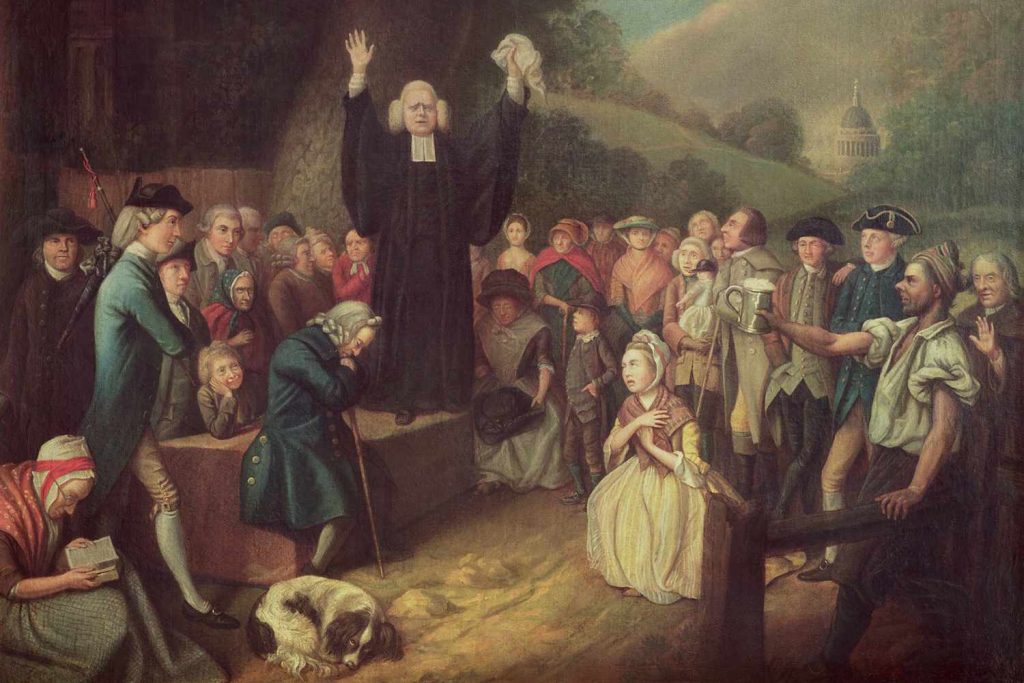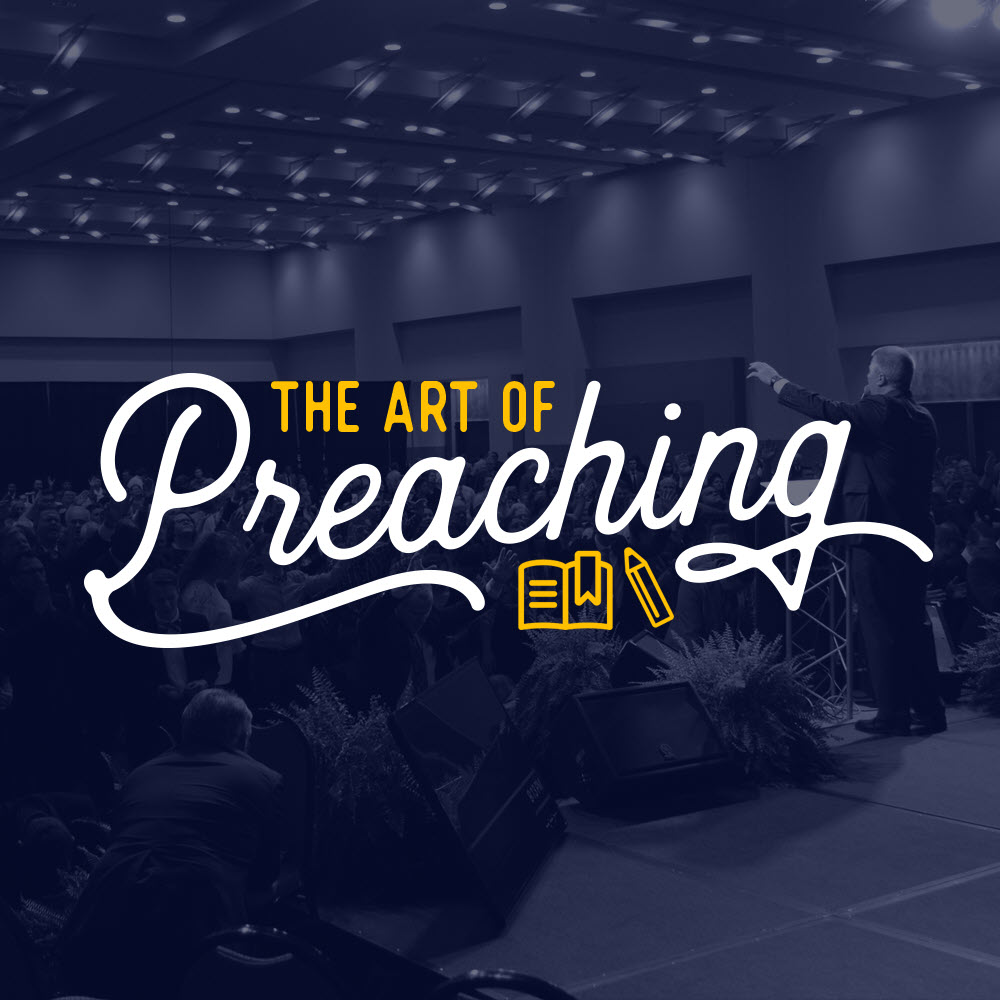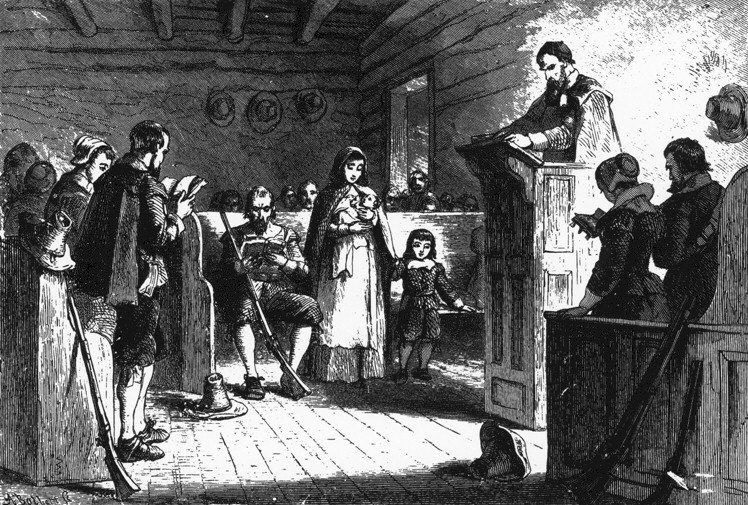British and American Preaching Since 1900 – John Pitts

Preaching is a specialized form of the art of communication. With pardonable exaggeration it has been called “the finest of fine arts” (A. T. Pierson). It is “the mediation of Divine Truth through human personality unto eternal life” (A. E. Garvie). Its characteristic form is the sermon, which is “an oral address to the popular mind, upon some religious truth as contained in the Scriptures, and elaborately treated with a view to persuasion” (Austin Phelps). And its aim, broadly speaking, is “to bind eternal truth be present fact.”
A sermon is a speech (Latin sermo) but Christian preaching is much more than speechmaking—it is the communication to sinful men of the good news of God in Christ. As such it is centered in Christ as the Supreme revealer of God and the only redeemer of man. In its various forms it seeks to bring men into living fellowship with the eternal Christ that they may experience the fulness of the divine salvation. This means the realization of a new standing before God, and as its concomitant the reconstruction of the sin-distorted and sin-distrupted personality. “By Christ redeemed, In Christ restored” is the motif of all genuine Christian preaching. That is why a lecture is no more a sermon than a platform is a pulpit or an auditorium is a church (though many a compeling sermon has been delivered from a platform in an auditorium).
-
BRITISH PREACHING
In 1900 Britain was just at the end of the fabulous Victorian Era. The nineteenth century (especially the latter half) was a time of intellectual ferment, of social idealism, of political upheaval, of religious awareness, of ecclesiastical disturbance, of scientific and theological debate. New concepts of the universe and of man’s place in it were much in evidence; revolutionary social and political movements (Socialism, Marxism, Anarchism) were gaining momentum; a marked reaction from the hitherto rigid orthodoxy was dominant; and there was a considerable importation from the Continent of the “higher critical” theories of the Bible.
Of course, Christian people were much disturbed by this “new way of ideas.” This was especially true of orthodox believers; but even those with a more liberal theology had their difficulties. There was widespread irreligion among the lower classes, yet much of the vigor of the British people went into their religion—despite the fact that many of the leading intellectuals (T. H. Huxley, Herbert Spencer, Matthew Arnold, George Eliot, and others) were definitely anti-Christian. The Free Churches were increasing their hold on the lower and middle classes; the Church of England was in the throes of the Anglo-Catholic Revival; and even the Roman Church had made significant gains, both politically and socially.
Many preachers attempted either to combat the “new way of ideas” or to come to terms with it; and most of the sermons of that Age of Uncertainty were characterized by (one or more) Altitude, Latitude, Platitude, or Longitude. But there were gifted preachers—some strictly orthodox, others less so—who sought to assure the Christian public that the certitudes of the faith were unshaken. Chief among these were Frederick William Robertson, whose deep spiritual insight and broad human sympathies had a powerful influence on the working classes; Frederick Denison Maurice, whose ecclesiastical career was a stormy one on account of his unorthodox eschatology and advanced political ideas; Frederick William Farrar, Dean of Canterbury, who influenced greatly the religious feelings and attitudes of the middle classes; Arthur Penrhyn Stanley, who as Dean of Westminster sought to make the Abbey a house of prayer for all Christians, irrespective of their dogmatic creed; William Boyd Carpenter, Bishop of Ripon, an evangelical orator of the first order; and Henry Parry Liddon, whose powerful preaching as Canon of St. Paul’s Cathedral attracted immense crowds, and who was regarded by his fellow Anglicans as the greatest preacher of his time. The above mentioned were all Anglican clergymen; they were illustrious representatives of a tradition wherein the general level of preaching was none too high.
In the Free Churches the pulpit was more highly regarded than the altar; hence the quality of the preaching ministry was somewhat superior. And there were outstanding preachers too. Robert William Dale, of Birmingham, was the intellectual leader of the Congregationalists; indeed, of the Free Churches generally. He was a first class theologian (as witness his volume on The Atonement), who was not afraid to preach doctrinal and ethical sermons which called for the closest attention of the hearers. Thomas Charles Edwards, a Welshman, was another great theologian who was also a great preacher. Another Welshman was Herber Evans, who for overwhelming eloquence Sir William Robertson Nicoll placed above every other preacher he had heard. Yet another Welshman was Hugh Price Hughes, a fiery yet cultured follower of John Wesley, who never wearied in his sermons to “pursue sinners.”
The Scottish pulpit also had its luminaries. Henry Drummond, a Free Church of Scotland layman and close associate of D. L. Moody, was keenly interested in lessening the conflict between science and religion. His preaching made a great impact on college students. George Matheson was blind from young manhood. Yet he soon came to be recognized as a great orator, a powerful thinker, and a master of expression—“potentially the greatest man given to the Scottish churches since the days of Thomas Chalmers” (W. R. Nicoll).
The preaching ministries of Alexander Whyte and James Stalker belong to this period, though both lived until after the close of World War I. Whyte was a “high Calvinist,” who was sometimes described as “the last of the Puritans.” In his sermons he revealed an intense consciousness of the sinfulness of sin. He denounced the shams and vices and respectable sins of his highly respectable congregation; nevertheless Free St. George’s Church, Edinburgh, was always crowded to the door. Two of his junior colleagues may be mentioned here. John Kelman succeeded J. H. Jowett at Fifth Avenue Presbyterian Church, New York. Hugh Black became a distinguished member of the faculty of Union Seminary, New York. His brother James Black succeeded Whyte, carrying on a great preaching tradition.
James Stalker was a distinct loss to the regular preaching ministry when he exchanged his Glasgow pulpit for the Aberdeen professorship. An outstanding preacher, he knew how to fuse sound scholarship and clear thinking into memorable discourses. He too was a Calvinist, but he liked to stress in his thinking that “the death of Christ is sufficient for all, adapted to all, and freely offered to all.”
During the latter half of the Victorian Era three evangelical preachers of genius stood out above all others. First and foremost was Charles Haddon Spurgeon who, with one exception, was the greatest Baptist who ever “prepared the way of the Lord.” He died in 1892, his end probably hastened by the unhappy Downgrade Controversy in which he was involved. The general Christian public, and not a few of the intelligentsia, considered him the greatest preacher of the century. By today’s standards his formal ministerial education was meager, but he was widely read, especially in Puritan theology. He possessed great natural gifts—a magnificent “bell voice,” a rare and ready command of homespun English, a racy style of speaking, a saving sense of humor, a deep insight into the spiritual needs of the common man, and utter devotion to Christ. His impact on the religious life of Britain (and of America) was tremendous. His theology was moderately Calvinistic, his sermons warmly evangelistic, and his presentation of the gospel so fresh and refreshing that within a few months of entering upon his London ministry, at nineteen years of age, the crowds flocked to hear him and continued to do so for thirty-eight years.
His most distinguished Baptist contemporary was Alexander Maclaren, for forty-five years minister of Union Chapel, Manchester. Maclaren was called the “Prince of Expositors.” Indeed, he was described as “the supreme example, the perfect type, of the classic Protestant tradition of expository preaching” (Ernest H. Jeffs); and his many volumes bear ample testimony to that fact.
Joseph Parker was a Congregationalist, the first minister of the City Temple, London. He was eccentric, emotional, theatrical, often sensational. To see his leonine figure in the pulpit was a never-to-be forgotten sight, and to hear him preach was to enjoy oratory at its highest. And the note he liked to strike was not so much the need for repentance; rather he sought to create in men’s hearts “a warm, human sentiment of wondering love for Jesus Christ.”
Parker’s successor was Reginald John Campbell, a man with much personal charm, high preaching ability, but with an unstable theology. Parker profoundly disliked the new liberalism in religion, but Campbell welcomed it with open arms. Soon he was involved in the New Theology Controversy, owing to his over insistence upon the immanence of God and his radical views of Scripture. Yet he remained the “idol” of a vast number of people, even when he surprised everyone by “going over to Anglicanism.” It was then that Campbell recanted his theological aberrations. Yet even in the midst of bitter debate he could say sincerely, “Jesus Christ is central for my spiritual life.… I worship Him and trust my soul to Him” (A Spiritual Pilgrimage).
Peter Taylor Forsyth, “a Barthian before Barth,” was a preacher of considerable influence before he left the pastorate for the presidency of a Congregational seminary. Yet his sermons were far from easy to understand. He used to say, “People say that I preach above their heads. My reply is ‘Lift up your heads.’ ” He was a vigorous opponent of Campbell’s New Theology which he characterized as being “like a bad photograph, under-developed and over exposed.”
Three outstanding Methodists belong to this period, namely, William L. Watkinson, who attracted crowds of men to his famous noonday lectures in Manchester; John Ernest Rattenbury, a worthy successor to Hugh Price Hughes at the West London Mission; and Frederick Luke Wiseman, whose dramatic handling of Bible incidents was unforgettable.
Two outstanding preachers who belonged to pre-1914 days were John Watson (“Ian Maclaren”) and Charles Silvester Home. Watson’s twenty-five year ministry in Liverpool was phenomenal. He was a brilliant writer and a compelling preacher who never treated any theme “without a strong sense of moral responsibility.” Silvester Home was a natural-born speaker, who at times could rise to matchless eloquence. He managed to combine a great ministry in Central London with being a Member of Parliament. He believed in taking his religion into politics, holding that the latter is the natural extension of the former.
August, 1914 saw the beginning of World War I. It was also the beginning of a new era for Christianity. The church had come to that momentous date on a rising tide of expanding influence, having counteracted the secularizing currents of the preceding period with considerable success. This new era—“post-Christian” according to some—came with apparent suddenness. Humanity was now on the march, and in some ways the march seemed to be away from the Christian faith.
Such a world-shaking event as the war was bound to put its mark on the preaching of the gospel. The most obvious and significant example of this was the changed attitude to the problem of war. Prior to 1914 most British (Free Church, at any rate) and American preachers regarded armed conflict between nations as a blatant denial of the teaching of Christ, and cherished the illusion that war on a grand scale was a thing of the past. Indeed, prior to America’s entrance into the conflict, many of the nation’s outstanding preachers continued to denounce war as anti-Christian. But in the British Commonwealth it was different. The war was proclaimed to be a just one, even a holy crusade; and by the time the United States had become a participant most American preachers were saying the same thing. Even Harry Emerson Fosdick had not then been converted to absolute pacifism. He, like most preachers, regarded The Challenge of the Present Crisis (the title of the book written when he was a chaplain) as a call to go out and fight the enemy.
Furthermore, the coming of the war, and its awful slaughter, severely discredited the facile social and political optimism inherited from the nineteenth century. The secular doctrine of the inevitable progress of the human race, so often stressed in liberal pulpits, lost its hold despite the hope that this was the war to end all wars and so “make the world safe for democracy.” Man’s “Total Depravity” was an old doctrine now become less suspect; even that of “Original Sin” seemed more respectable. Then, with the coming of World War II, piling horror upon horror, and presaging a new era in which the nuclear annihilation of all mankind became possible, this swing to the theological right was given further impetus.
During World War I and the decades following there were many distinguished preachers in Britain. The National Church could boast of Charles Gore, Bishop of Oxford, who sought to come to terms with the higher criticism of the Old Testament while remaining loyal to his High Church theology; William Ralph Inge, Dean of St. Paul’s (“The Gloomy Dean”), who because of his caustic comments on religion and social matters gained a reputation out of all proportion to his oratorical ability; H. Hensley Henson, Bishop of Durham, who, like Dean Inge, was a Broad Churchman, and a staunch champion of the reasonableness of the Christian faith; William Temple, Archbishop first of York, then of Canterbury, called “the greatest churchman of this century,” who was a philosopher-theologian par excellence, and who could be quite at home in the greatest intellectual company; H. R. L. (“Dick”) Sheppard, an unrepentant pacifist whose broadcast preaching during the earliest days of radio was phenomenal; G. A. Studdert-Kennedy (“Woodbine Willie”), whose unconventional and passionate preaching captivated the British troops in France; and J. Stuart Holden, an evangelical preacher of rare power.
In the English Free Church pulpits there were giants: George Campbell Morgan, who had inherited McLaren’s mantle as the “Prince of Expositors,” and was exercising a mighty ministry in the shadow of Buckingham Palace; John Henry Jowett, “the greatest living preacher” of his day, who returned from New York to succeed Campbell Morgan, and to continue to preach “a Gospel of delicate sympathy rather than of sturdy strength” (Horton Davies); Dinsdale T. Young, a Methodist of the old school, a “royal preacher” with great oratorical ability, and who was followed by W. E. Sangster, “an evangelical greatheart,” whose intellect matched his spirituality”; Frederick B. Meyer, who as a young Baptist minister had learned from D. L. Moody “the art of winning men for Christ”; Joseph Fort Newton, a liberal American who fulfilled a brilliant, though short, ministry in the City Temple during the war, and who was succeeded by the Australian Baptist, Frederick W. Norwood, through whose vigorous preaching the City Temple was saved from extinction; Leslie D. Weatherhead, who made skilfull use of the widespread interest in the New Psychology to commend the gospel, becoming the most popular British preacher of the time; John Clifford, the intellectual and spiritual leader of the General Baptists; John D. Jones, a Welshman who came to the forefront among the English Congregationalists, whose preaching ability was matched by his great skill as an organizer; Robert F. Horton, another Congregationalist, whose very effective ministry to the intellectuals of North London was not unlike that of Harry Emerson Fosdick at the Riverside Church; and William E. Orchard, a most unorthodox preacher until he left his Presbyterian-Congregationalist heritage for the Church of Rome.
Two who were unordained are deserving of mention: Terence Reavely Glover, Public Orator of Cambridge University, a Baptist layman whose unconventional sermons influenced students; and Miss A. Maude Royden, an Anglican who became Fort Newton’s colleague at the City Temple.
Scotland has long been a country of great preaching, where there were many outstanding pulpiteers during and after World War I. Chief among these were: George H. Morrison, Arthur John Gossip, John A. Hutton, Hubert L. Simpson (all of Glasgow); William M. Clow and J. R. P. Sclater (both of Edinburgh).
Morrison was, at the height of his ministry, the most popular preacher in Scotland. He was described as “the average preacher raised to the nth degree.” His was positive preaching based on Biblical truth; and through his many volumes of sermons became widely known in Britain and America. Gossip was a torrential speaker, racing from point to point and idea to idea so rapidly that his hearers were left breathless. But his sermons made their mark. Hutton and Simpson were “clever” preachers, richly imaginative, and well able in their sermons to find “a foothold in Scripture for the uneasy mind of the age.” Clow was a rare combination of scholar and evangelist. His sermons were richly Biblical, characterized by an unmistakable note of urgency. Sclater had phenomenal success with college students.
During the last two decades James S. Stewart of Edinburgh has been in Scotland. He is as popular in America as he is in Britain. A fine exponent of Pauline theology, his is preaching with the cross at its center.
-
AMERICAN PREACHING
America has had a fine tradition of great preaching, especially during the last 100 years. There have been a few pulpit giants, and more than a few near-giants—men of marked intellectual achievement, outstanding oratorical ability, and true spiritual eminence. Some have been strongly conservative theologically, like John Hall, George W. Truett, Mark A. Matthews, T. De Witt Talmage, Walter A. Maier, and Clarence Macartney. Others have been just as strongly liberal theologically, like George A. Gordon, Francis Greenwood Peabody, Charles Reynolds Brown, Henry Sloan Coffin, Lynn Harold Hough, and Reinhold Niebuhr. But the majority of distinguished American preachers have been somewhere in-between, being well represented by such influential pulpiteers as S. Parkes Cadman, Peter Marshall, George A. Buttrick (and his successor David H. C. Read), Joseph R. Sizoo, Paul E. Scherer, Ralph W. Sockman, Charles E. Jefferson, and Harris E. Kirk. Cadman, Marshall, Buttrick, and Read are importees from Britain.
The great evangelists of the period have all been emphatically conservative, which fact contributed mightily to their preaching appeal. Dwight L. Moody was followed by B. Fay Mills, Reuben A. Torrey, J. Wilbur Chapman, William A. Sunday, and William F. Graham. Two outstanding Roman Catholic preachers may be mentioned: Father Charles E. Coughlin and Bishop Fulton J. Sheen.
The two preaching giants of the nineteenth century were Henry Ward Beecher and Bishop Phillips Brooks. For forty years Beecher (“the American Spurgeon”) reigned from his pulpit throne in Brooklyn; and by his vigorous—sometimes sensational—preaching made Plymouth Church a national institution. In an era of challenging social and intellectual change, he stood forth as a prodigious figure, voicing the hopes and thoughts of the common people.
Phillips Brooks, like Beecher, was a preacher of genius, though the latter surpassed him in sheer oratorical power. He was much influenced by the liberalism of F. W. Robertson and F. D. Maurice; and this fact wedded to passionate sincerity and deep spiritual insight profoundly impressed his hearers.
Horace Bushnell, an older contemporary of Beecher and Brooks, was the real father of American theological liberalism. He emphasized the immanence of God in nature and in man, the atoning work of Christ as a concrete expression of divine love, and the fundamental need of religious education of the children.
Walter Rauschenbusch, “the most creative spirit in the American theological world,” was the father of the Social Gospel—“the most significant contribution to the great ongoing stream of Christianity.”
Washington Gladden was also a pioneer in the social application of the principles of Jesus. He was a vigorous champion of the rights of labor and a brilliant defender of the faith as he understood it.
From the end of World War I to the end of World War II the most outstanding American preacher was Harry Emerson Fosdick, a most prolific sermonizer and a widely read author. He was an unabashed exponent of a pronounced liberal theology, the advocate of an “Adventurous Christianity.” Fosdick has been the storm center of theological controversy through most of his ministry. His famous sermon on “Shall the Fundamentalists Win?” evoked an answer from John Roach Straton, a doughty champion of orthodoxy, entitled: “Shall the Funny-monkeyists Win?” Yet the evangelical core of Fosdick’s preaching has been noted even by some of the most conservative among his critics.
British preaching on the whole has tended to be Biblical and expository. American preaching is not altogether lacking in this respect, especially where the preacher has been influenced by the Neo-orthodoxy of Karl Barth, Emil Brunner, and Reinhold Niebuhr. However, “problem preaching” and “life situation” sermons are very much in evidence in the American pulpit today. Robert James McCracken, Fosdick’s able successor at the Riverside Church, has largely departed from the Scottish tradition of preaching in which he was reared, and has adopted the type of sermon so closely associated with his distinguished predecessor. There is a good deal of “suburban preaching” in the American pulpit, by which is meant preaching “which makes its home in the fringes and outskirts of Christian truth rather than in the center and citadel.”
As for the Social Gospel, it is still a strong factor in the American presentation of the Christian faith, though it is now characterized by changing emphases. There are some pulpiteers “who preach the social gospel because they have no other gospel to preach” (James Denney); nevertheless, there are staunch evangelicals who know how to stress the social implications of Christ’s teaching without any lessening of their “passion for souls.”
There are some other changing emphases in the contemporary pulpit. Conservative evangelicals have, with some minor reinterpretations, remained loyal to the traditional orthodox theology; for example, they lay undeviating stress upon the deity of Christ, His virgin birth, His physical resurrection, and His second coming. In extremely liberal pulpits, especially where Bultmannism and Tillichism are influential, these cardinal Fundamentalist doctrines are anathema. But there are also changes among moderate evangelicals. Some form of the Moral Influence theory of the death of Christ has been substituted for the older substitutionary theory of the atonement, giving rise in some instances to a “cross-less” Christianity. The fact of Christ is stressed, but this often goes hand-in-hand with an attenuated Christology. A subtle humanism has gained access to some prominent pulpits; and this secularized gospel can be clothed in specious psychological jargon in which “peace of mind” and “adjustment to life’s tensions” are regarded as life’s summum bonum and the quintessence of personal salvation.
BIBLIOGRAPHY
Chrisman, Lewis H., The Message of the American Pulpit. New York: Richard R. Smith, 1930.
Davies, Horton, Varieties of English Preaching 1900–1960. New York: Prentice Hall, 1963.
Gammie, Alexander, Preachers I Have Heard. Glasgow: Pickering & Inglis, 1946.
Garvie, Alfred E., The Christian Preacher. New York: Chas. Scribner’s Sons, 1920.
Jeffs, Ernest H., Princes of the Modern Pulpit. London: Sampson Low, Marston & Co., n.d.
Jones, Edgar DeWitt, The Royalty of the Pulpit. New York: Harper & Brothers, 1951.
Marchant, Sir James, British Preachers. New York: G. P. Putnam’s Sons, 1928.
Nicoll, W. Robertson, Princes of the Church. London: Hodder & Stoughton, 1921.
Porrit, Arthur, The Best I Remember. New York: George H. Doran Co., n.d.
Sinclair, Hugh, Voices of Today. London, James Clarke & Co., 1912.
Pitts, J. 1967. British and American Preaching Since 1900. In R. G. Turnbull (Ed.), Baker’s dictionary of practical theology. (R. G. Turnbull, Ed.) (12). Baker Book House: Grand Rapids, MI



